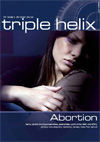ABC
'Abstinence, be faithful, condoms' has been a successful ABC in helping reduce HIV transmission in Uganda, but A for abstinence is apparently no longer a family planning choice. A new wall chart, produced by collaboration between the Johns Hopkins Bloomberg School of Public Health, WHO and USAID, is entitled Do you know your family planning choices? and offers a brief overview of eleven contraceptive methods. Abstinence is not one of them. Perhaps the chart is solely focused on the sexually active, but a reminder to them of another choice might not have come amiss. (www.infoforhealth.org
ABCD
Adapting the resuscitation mnemonic 'ABC - for airway, breathing, circulation' to a palliative care situation and adding another initial, Chochinov has brought dignity to the fore as an essential core element of all patient care. A is attitude, B is changing behaviour, C is ensuring compassion, and D actually stands for dialogue. Together they enhance patient dignity, which the Oxford English Dictionary defines as 'the state of being worthy of honour or respect'. (BMJ 2007; 335:167-8)
The book of Job
The BMJ has a series on 'Medical Classics' and recently ran an article on the book of Job. John Launer, senior clinical lecturer at the Tavistock Clinic, writes: 'A friend of mine, a Catholic priest, once described to me how he had to perform the funeral of a small child. He told me that there was only one way that it was possible for him to do it with any degree of honesty or authenticity: to offer no explanations, no pretence of understanding, no defence of his faith. Good doctors, and good counsellors, do likewise. The God of the book of Job is not the reasonable, bland God of wishful liberals, nor the vengeful and punishing God of fundamentalists. He is as he is. That is what makes this book possibly the most challenging in the whole Bible, and the most enduring handbook for any of us who have to deal professionally with tragedy, loss and despair.' (BMJ 2007; 335:453)
Prophets
Paying tribute in the British Journal of General Practice to a deceased GP hero, Peter Toon suggests he was a 'prophet'. This role he describes as 'prophesying not in the Harry Potter sense of predicting the future with uncertain accuracy, but as in the Old Testament, whose prophets denounce injustice and wrongdoing, and whose lives, speech, and writings transformed their society'. Good stuff, as is the following description of Amos, but Eutychus is less sure that 'Jeremiah's bizarre public behaviour and ranting would these days undoubtedly gain the attention of the local mental health team' and disagrees with 'we don't know what substances Ezekiel took, but they must have been pretty powerful, judging from his visions'. (BJGP 2007; September:758)
No miracle cures
'There will be none of the promised miracle cures from embryonic stem cell research' begins an Australian article, before continuing 'embryonic stem cell research has suffered a major blow with a major Singaporean/Australian company abandoning work on therapies due to lack of success and soaring costs'. The company, ESI, was attempting to turn embryonic stem cells into insulinproducing cells to treat diabetes and cardiac muscle cells to counter congestive heart failure. (The Courier-Mail 2007; 26 July. www.news.com.au
Adult stem cell success
By contrast, The Independent champions research led by the famous heart transplant surgeon, Professor Magdi Yacoub, where there are good results from stem cells taken from bone marrow being used to grow heart valves and muscle in the laboratory. The technique could be ready for human trials within three to five years. (The Independent 3 2007; September: www.news.independent.co.uk
O tempora, o mores
Eutychus can remember qualified colleagues being sent away from ward rounds for being improperly dressed, never mind medical students, so was saddened to read in an excellent article about school students getting work experience in medicine that 'Students are advised about appropriate dress: no plunging necklines, bare midriffs, or jeans. This area has been the source of more resistance and adverse comment about the scheme than any other'. And when they arrive: 'We supply ties to those who come dressed too casually and occasionally show them how to tie them'. (BMJ Careers 2007; 1 September:GP88)
Care of Catholic patients
A new website has been launched which aims to promote the Catholic ethos of care and to give guidance to doctors treating Catholic patients. The emphasis is on the church's vision of care for the whole person. (www.catholicsinhealthcare.org.uk)
Good for the brain
Private religious practices and higher levels of spirituality are associated with slower progression of Alzheimer's disease, but quality of life and speed of decline were not correlated. Seventy patients with probable Alzheimer's were followed in a longitudinal study, with cognitive decline being monitored by the mini-mental state examination. (Neurology 2007; 68:1509-14)
Good all round - for women
Attending religious services is linked with better physical and psychological health. For highly functioning elderly women, but not men, attending one or more religious services a week improved 'allostatic load', a measure of cumulative physiological dysfunction including blood pressure. This relationship was independent of better physical or social functioning. (Psychosomatic Medicine 2007; 69:464-72)































